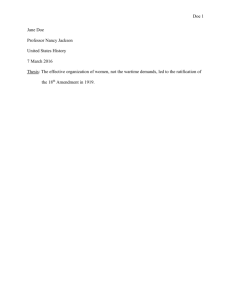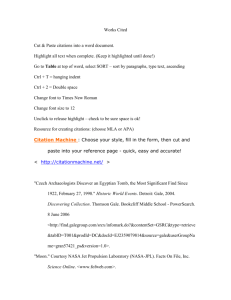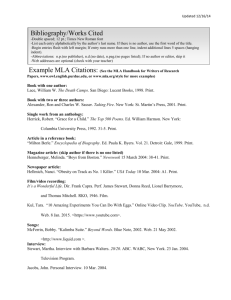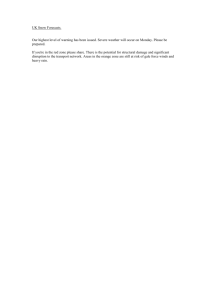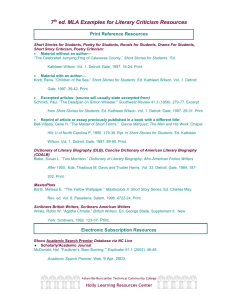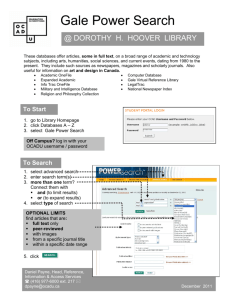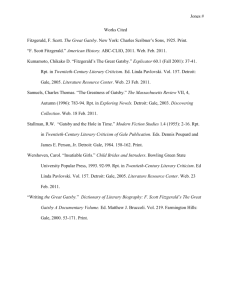English 10 (Honors and CPA)
advertisement
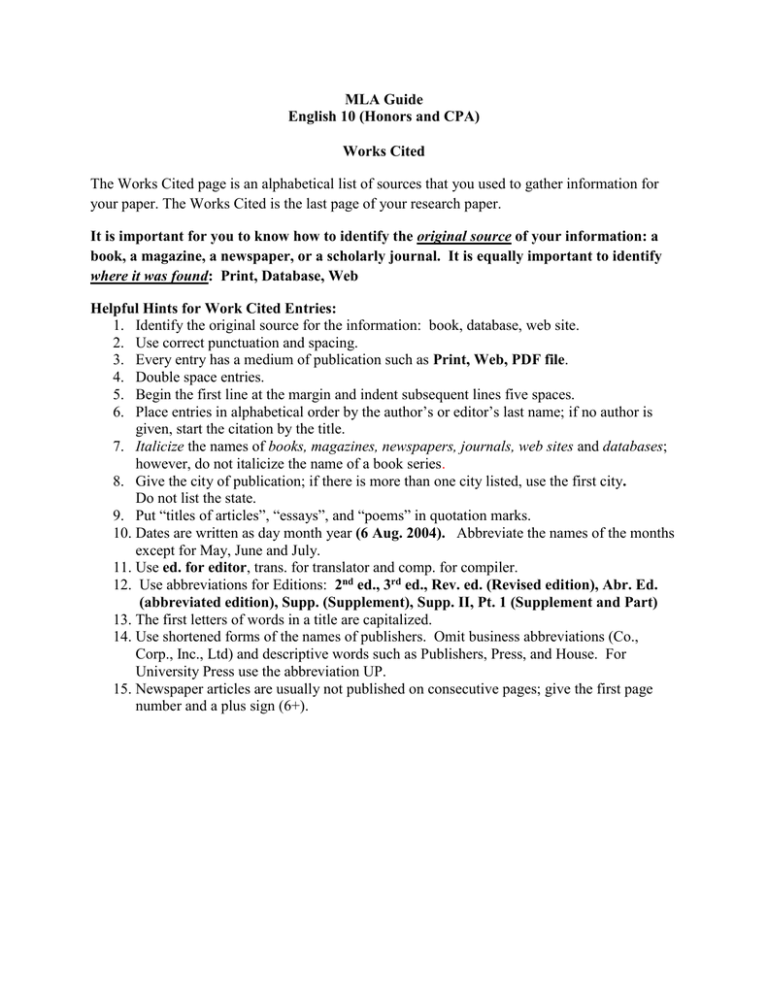
MLA Guide English 10 (Honors and CPA) Works Cited The Works Cited page is an alphabetical list of sources that you used to gather information for your paper. The Works Cited is the last page of your research paper. It is important for you to know how to identify the original source of your information: a book, a magazine, a newspaper, or a scholarly journal. It is equally important to identify where it was found: Print, Database, Web Helpful Hints for Work Cited Entries: 1. Identify the original source for the information: book, database, web site. 2. Use correct punctuation and spacing. 3. Every entry has a medium of publication such as Print, Web, PDF file. 4. Double space entries. 5. Begin the first line at the margin and indent subsequent lines five spaces. 6. Place entries in alphabetical order by the author’s or editor’s last name; if no author is given, start the citation by the title. 7. Italicize the names of books, magazines, newspapers, journals, web sites and databases; however, do not italicize the name of a book series. 8. Give the city of publication; if there is more than one city listed, use the first city. Do not list the state. 9. Put “titles of articles”, “essays”, and “poems” in quotation marks. 10. Dates are written as day month year (6 Aug. 2004). Abbreviate the names of the months except for May, June and July. 11. Use ed. for editor, trans. for translator and comp. for compiler. 12. Use abbreviations for Editions: 2nd ed., 3rd ed., Rev. ed. (Revised edition), Abr. Ed. (abbreviated edition), Supp. (Supplement), Supp. II, Pt. 1 (Supplement and Part) 13. The first letters of words in a title are capitalized. 14. Use shortened forms of the names of publishers. Omit business abbreviations (Co., Corp., Inc., Ltd) and descriptive words such as Publishers, Press, and House. For University Press use the abbreviation UP. 15. Newspaper articles are usually not published on consecutive pages; give the first page number and a plus sign (6+). Sources Found in Subscription Databases The IMC has many subscription databases that you will use in your research. These databases usually provide a citation at the end of the article. Use this as a guide, but always modify it so it follows the MLA format. The following is the information generally required: Author’s last and first name. “Title of the article.” Title of the original source. Place of publication: Publisher, Year. Title of the database. Medium--Web. Date of access (day, month, and year). Under most circumstances, there are no page numbers with subscription databases. The exception is an article from a book, newspaper, magazine or scholarly journal that is a PDF file. Since PDF files are exact copies, if the page numbers are included on the print out of the original article, the page numbers are included in the citation. Parenthetical Citations The purpose of a parenthetical citation, or in-text documentation, is to document where you found your information. In order to give credit to the authors for using their works, you must use a parenthetical citation. *Parenthetical citations are required for quotations, paraphrased information, ideas that are not common knowledge, statistics, figures, charts and graphs. Parenthetical citations refer the reader to your Works Cited page at the end of your paper. Do not use back-to-back parenthetical citations; each citation should be followed by your own ideas, explanations, or analysis. Helpful Hints for Writing Parenthetical Citations As a general rule, the punctuation is placed after the parenthetical citation. (The exceptions to the rule are long quotations, exclamation points, and question marks.) Example: "The Black Cat" is a horrifying story of animal abuse and murder, told in the first person by a man who undergoes an alarming change of character (“The Black Cat”). If your quote is more than three or four lines, it is considered a long quote. Long quotes should be set off from the rest of the text in your paper by a colon (:). Next, you should begin a new line, indenting 1 inch (10 spaces or 2 tabs), and typing it in double space without quotation marks. In this instance, the parenthetical citation is placed after the period. Example: Most people view “The Tell-Tale Heart” as just a good horror story, but it is much more: It is admired as an excellent example of how a short story can produce an effect on the reader. Poe believed that all good literature must create a unity of effect on the reader and this effect must reveal truth or evoke emotions. “The Tell-Tale Heart” exemplifies Poe's ability to expose the dark side of humankind and is a harbinger of novels and films dealing with psychological realism. (Gargano) Sample Works Cited Gilman, Charlotte Perkins. “The Yellow Wallpaper.” Holt McDougal Literature: American Literature Grade 11. Eds. Janet Allen and Arthur N. Applebee, et.al. Orlando: Houghton Mifflin Harcourt, 2012. 796-813. Print. Higgins, Andrew C. "Cavalry Crossing A Ford." Masterplots II: Poetry. Rev. ed. Salem, 2002. Literary Reference Center. Web. 13 Mar. 2013. Moses, Edwin. "The Open Boat." Magill’s Survey of American Literature. Rev. ed. Salem, 2006. Literary Reference Center. Web. 13 Mar. 2013. "“The Outcasts of Poker Flat”." Literature and Its Times: Profiles of 300 Notable Literary Works and the Historical Events that Influenced Them. Eds. Joyce Moss and George Wilson. Vol. 2: Civil Wars to Frontier Societies (1800-1880s). Detroit: Gale, 1997. 281-287. Gale Virtual Reference Library. Web. 15 Mar. 2013. "Poe, Edgar Allan (1809-1849)." Discovering Biography. Online ed. Detroit: Gale, 2003. Discovering Collection. Web. 15 Mar. 2013. "Realism." Literary Movements for Students: Presenting Analysis, Context, and Criticism on Literary Movements. Ed. Ira Mark Milne. 2nd ed. Vol. 2. Detroit: Gale, 2009. 654-681. Gale Virtual Reference Library. Web. 11 Mar. 2013. Richardson, Judith. "The Legend of Sleepy Hollow." American History Through Literature 1820-1870. Eds. Janet Gabler-Hover and Robert Sattelmeyer. Vol. 2. Detroit: Charles Scribner's Sons, 2006. 635-639. Gale Virtual Reference Library. Web. 15 Mar. 2013. "Young Goodman Brown." Short Stories for Students. Ed. Kathleen Wilson. Vol. 1. Detroit: Gale, 1997. 294-311. Gale Virtual Reference Library. Web. 15 Mar. 2013. Sample Format Name of Database "Realism." Literary Movements for Students: Presenting Analysis, Gale Virtual Reference Library Context, and Criticism on Literary Movements. Ed. Ira Mark Literary Movements for Students Milne. 2nd ed. Vol. 2. Detroit: Gale, 2009. 654-681. Gale Virtual Reference Library. Web. 11 Mar. 2013. Author’s Last name, First name (if given). “Title of the Article.” Name of the Book: Series Title. Editor’s first and last name. Edition (if given). Volume. City of Publication: Publisher, Year. Page numbers. Name of eBook Database. Medium. Date of access. Literary Reference Center Higgins, Andrew C. "Cavalry Crossing A Ford." Masterplots II: Poetry. Masterplots Rev. ed. Salem, 2002. Literary Reference Center. Web. 13 Mar. 2013. Author’s last name, first name. “Title of Essay.” Name of the Book: Series Title. Edition. Publisher, Year. Name of the Database. Medium. Date of access. Literary Reference Center Moses, Edwin. "The Open Boat." Magill’s Survey of American Literature. Rev. ed. Salem, 2006. Literary Reference Center. Web. 13 Mar. 2013. Author’s last name, first name. “Title of Essay.” Name of the Book. Edition. Publisher, Year. Name of the Database. Medium. Date of access. Magill’s Survey of American Literature "Young Goodman Brown." Short Stories for Students. Ed. Kathleen Wilson. Vol. 1. Detroit: Gale, 1997. 294-311. Gale Virtual Reference Library Short Stories for Students Gale Virtual Reference Library. Web. 15 Mar. 2013. Author’s last name, first name (if given). “Title of Essay.” Name of the Book. Editor’s first and last name. Volume. City of Publication: Publisher, Year. Page numbers. Name of eBook Database. Medium. Date of access. Richardson, Judith. "The Legend of Sleepy Hollow." American History Gale Virtual Reference Library Through Literature 1820-1870. Eds. Janet Gabler-Hover and Robert Sattelmeyer. Vol. 2. Detroit: Charles Scribner's Sons, American History Through Literature 2006. 635-639. Gale Virtual Reference Library. Web. 15 Mar. 2013. Author’s last name, first name (if given). “Title of Essay.” Name of the Book. Editor’s first and last name. Volume. City of Publication: Publisher, Year. Page numbers. Name of eBook Database. Medium. Date of access. Benton, Richard P. "The Cask of Amontillado by Edgar Allan Poe, Gale Virtual Reference Library 1846." Reference Guide to Short Fiction. Ed. Thomas Riggs. Reference Guide to Short Fiction 2nd ed. Detroit: St. James, 1999. 777-779. Gale Virtual Reference Library. Web. 15 Mar. 2013. Author’s last name, first name (if given). “Title of Essay.” Name of the Book. Editor’s first and last name. Edition. City of Publication: Publisher, Year. Page numbers. Name of eBook Database. Medium. Date of access. "“The Outcasts of Poker Flat”." Literature and Its Times: Profiles of Gale Virtual Reference Library 300 Notable Literary Works and the Historical Events that Literature and Its Times Influenced Them. Eds. Joyce Moss and George Wilson. Vol. 2: Civil Wars to Frontier Societies (1800-1880s). Detroit: Gale, 1997. 281-287. Gale Virtual Reference Library. Web. 15 Mar. 2013. Author’s last name, first name (if given). “Title of Essay.” Name of the Book: Series Title. Editor’s first and last name. Volume: Title of Series. City of Publication: Publisher, Year. Page numbers. Name of eBook Database. Medium. Date of access. "Poe, Edgar Allan (1809-1849)." Discovering Biography. Online ed. Discovering Collection Detroit: Gale, 2003. Discovering Collection. Web. 15 Mar. Discovering Biography 2013. “Title of Essay.” Name of the Book. Edition. City of Publication: Publisher, Year. Name of the Database. Medium. Date of access. Cather, Willa. "Paul's Case." Youth and the Bright Medusa. Vintage, LitFinder for Schools 1975. 181. LitFinder for Schools. Web. 11 Mar. 2013. Author’s last name, first name. “Title of the short story.” Name of the Online text of short story Book. Publisher, Year. Page number. Name of the Database. Medium. Date of access. Hawthorne, Nathaniel. The Scarlet Letter. Philadelphia: Running, Book with one author 1986. Print. Author’s last name, first name. Name of the Book. City of Publication: Publisher, Year. Medium. Gilman, Charlotte Perkins. “The Yellow Wallpaper.” Holt McDougal Literature Textbook Literature: American Literature Grade 11. Eds. Janet Allen and Arthur N. Applebee, et.al. Orlando: Houghton Mifflin Harcourt, 2012. 796-813. Print. Author’s last name, first name. “Title of Short Story.” Name of Book: Series Title. Editor’s first and last name. City of Publication: Publisher, Year. Page numbers. Medium.
